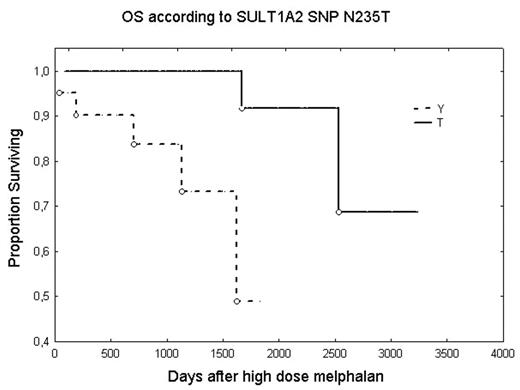Abstract
High dose melphalan is an essential component in the treatment of patients with advanced multiple myeloma. However little is known regarding genetic polymorphisms possibly correlated with patient outcome in this setting. To identify polymorphisms predictive of survival and/or toxicity we performed a SNP analysis in 83 patients having received high dose melphalan for multiple myeloma. All patients had received one or two courses of high dose melphalan with stem cell reinfusion. DNA was obtained from peripheral blood mononuclear cells and analyzed for 230 SNPs in genes selected for their role in drug metabolism, DNA repair, cell cycling or apoptosis. There were 48 males and 35 females and the median age was 58 years. The average number of VAD courses received before high dose melphalan was 4 (3–6). 49 patients received two high dose melphalan courses. The best response to melphalan was CR in 22 pts, very good response in 14 pts, partial response in 37 patients and stable or progressive disease in 10 patients. 37 patients had experienced disease progression and 8 patients had died at last follow-up. 29 patients experienced high grade (III-IV) mucositis after high dose melphalan. The median freedom from progression was 40 months. CYP2E1 polymorphism 7632 was correlated with freedom from progression (FFP) after high dose melphalan (p=0.02). SULT1A2 704 polymorphism was correlated both with FFP (p=0.002) and with overall survival (p=0.001). Occurrence of severe mucositis after high dose melphalan therapy was correlated with XRCC1 polymorphism 1198 (24% vs 51% of high grade mucositis) as well as ATM polymorphisms. These results suggest that SNPs of genes involved in drug metabolism or repair could be used to distinguish patients subgroups with different toxicity/efficacy profiles after high dose melphalan.
OS according to SULT1A2 N235T
Disclosure: No relevant conflicts of interest to declare.
Author notes
Corresponding author


This feature is available to Subscribers Only
Sign In or Create an Account Close Modal